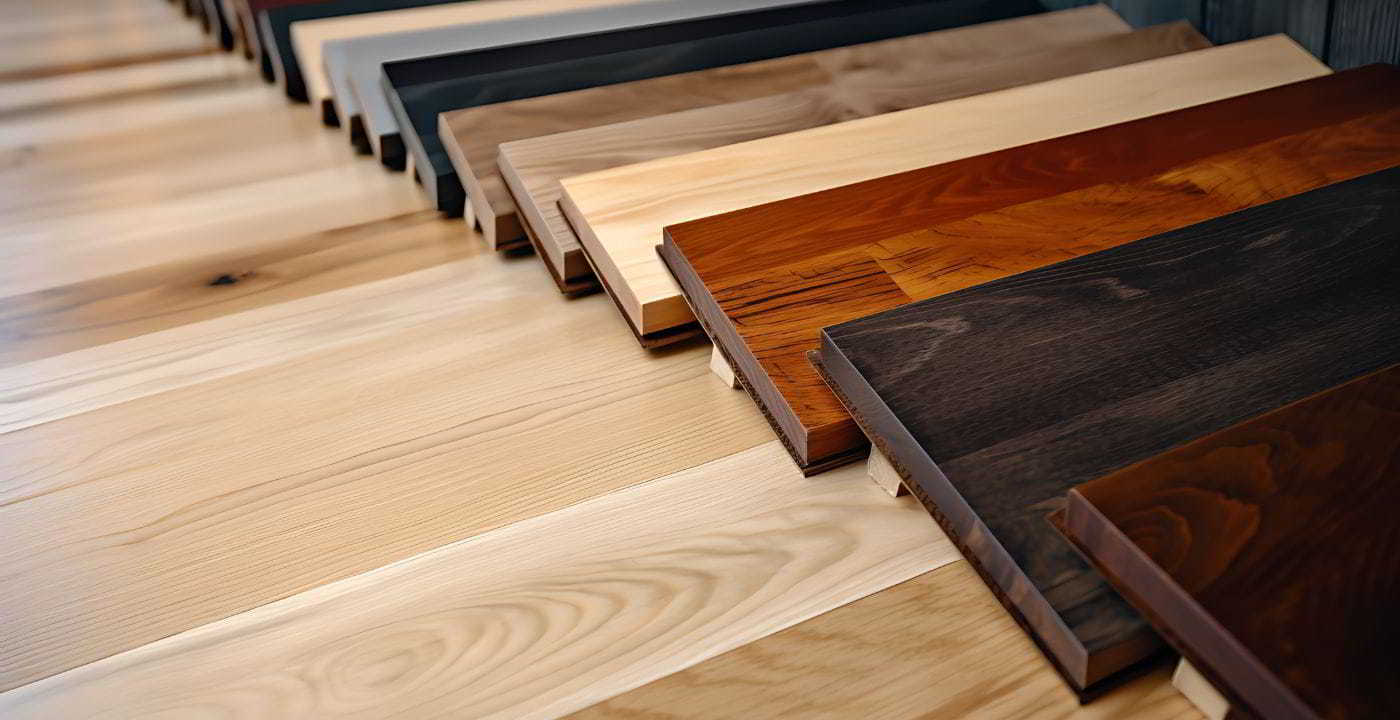
Hardwood Flooring Cost Breakdown
Here’s a quick look at the cost per sq ft:
| Size by Square Feet | Low-End Estimate | Average Cost | High-End Estimate |
|---|---|---|---|
| 500 | $3,000 | $7,750 | $11,500 |
| 1,000 | $6,000 | $14,500 | $23,000 |
| 1,500 | $9,000 | $21,750 | $34,500 |
| 2,000 | $12,000 | $29,000 | $46,000 |
| 2,500 | $15,000 | $36,250 | $57,500 |
| 3,000 | $18,000 | $43,500 | $69,000 |
Materials: $4 to $12 per square foot
The type and quality of hardwood flooring affect the cost of the project. You can choose from common woods like oak and maple or exotic ones like Brazilian cherry and teak. Each type has different features and costs.
Domestic Hardwood
Domestic woods like oak, maple, and hickory are easy to find and cost $4 to $8 per square foot. They are strong and flexible, making them a top pick for many homeowners.
Exotic Hardwood
Exotic woods like Brazilian cherry, teak, and mahogany have unique looks and colors. They are more expensive, costing $8 to $12 per square foot, but many people love their special style.
| Hardwood Species | Average Cost per Square Foot (Materials Only) | Average Total Cost per Square Foot (Including Installation) |
|---|---|---|
| Oak | $4 – $8 | $8 – $15 |
| Maple | $5 – $9 | $9 – $16 |
| Hickory | $6 – $10 | $10 – $17 |
| Cherry | $7 – $11 | $11 – $18 |
| Walnut | $8 – $12 | $12 – $19 |
| Ash | $6 – $10 | $10 – $17 |
| Birch | $5 – $9 | $9 – $16 |
| Teak | $9 – $13 | $13 – $20 |
| Mahogany | $10 – $14 | $14 – $21 |
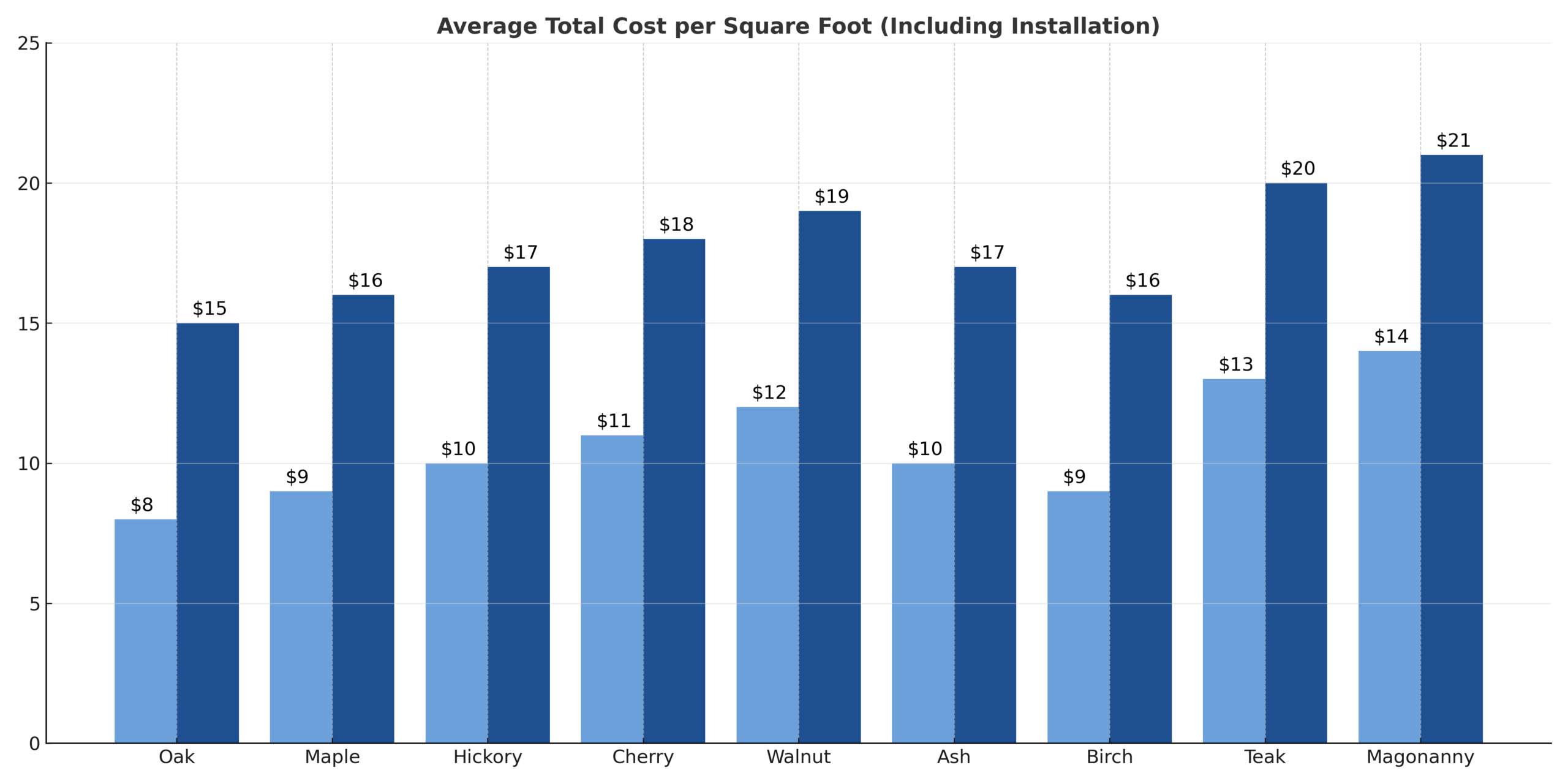
Labor: $4 to $8 per square foot
Labor costs can make up 50% to 70% of the total price. Getting professionals to install hardwood floors ensures everything is done right for a great finish.
Labor costs usually cover putting down the flooring, preparing the subfloor, and adding finishing touches.
Installation
Installing hardwood floors needs skill to look seamless. Installers might charge $4 to $8 per square foot, depending on the job’s complexity and local rates.
Finishing
Besides installation, labor costs can include finishing services like sanding, staining, and sealing. These make the floors look good and last a long time.
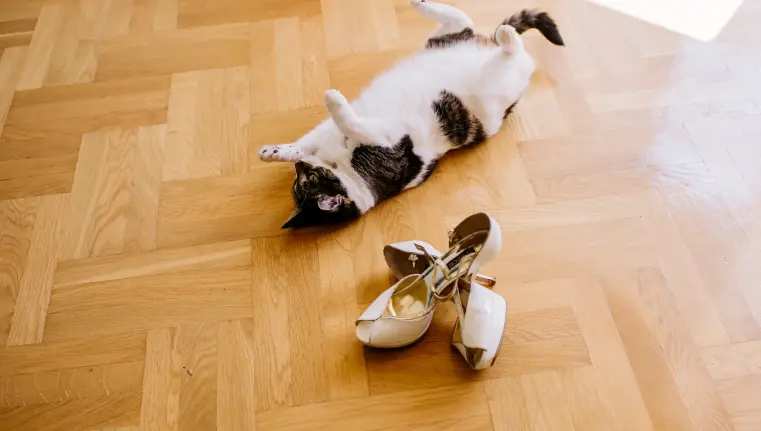
Subfloor Preparation: $1 to $2 per square foot
Getting the subfloor ready is very important for making hardwood floors last a long time. This means fixing uneven spots, repairing any damage, and putting in moisture barriers.
Leveling
If the subfloor is not even or has damage, leveling it can give a smooth base for hardwood. This can cost between $1 to $2 per square foot, depending on the amount of work.
Moisture Protection
Moisture can harm hardwood floors, so putting in a moisture barrier is important, especially in wet areas. This typically costs $1 to $2 per square foot.
Removal of Existing Flooring: $1 to $3 per square foot
Before putting in new hardwood floors, old floors like carpet, tile, or laminate might need to be taken out. This makes the surface clean and flat for new hardwood.
Carpet Removal
Taking out carpet usually costs $1 to $2 per square foot, depending on the kind of carpet and if there is padding underneath.
Tile or Laminate Removal
Taking out tile or laminate might need more work and tools, so it can cost $2 to $3 per square foot.
Summary of hardwood flooring cost breakdown:
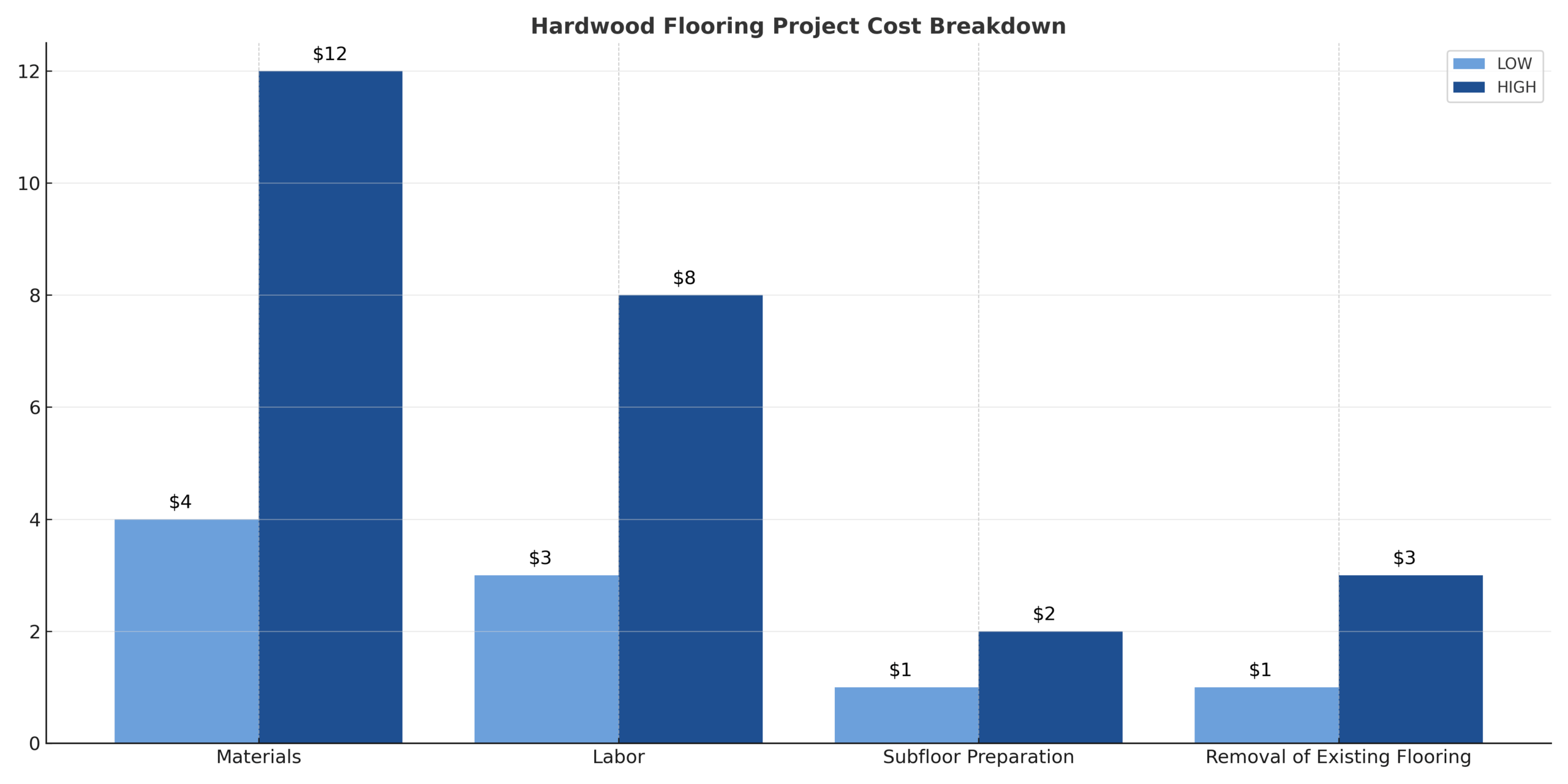
Solid Hardwood Flooring Installation
Solid hardwood flooring is known for its classic look and strength. Installing solid hardwood usually costs between $11 and $25 per square foot, including materials and labor.
The price can change based on the wood type, installation difficulty, and any extra services needed.
Installation Method
The way the flooring is installed can greatly affect the cost. Traditional nail-down installation is usually cheaper than glue-down or floating methods.
Additional Services
Sometimes, extra services are needed during installation, which can change the total cost. This includes preparing the floor, like leveling or adding a moisture barrier for a smooth, lasting finish.
Staining or finishing the floors may add costs but can make the floors look better and last longer.
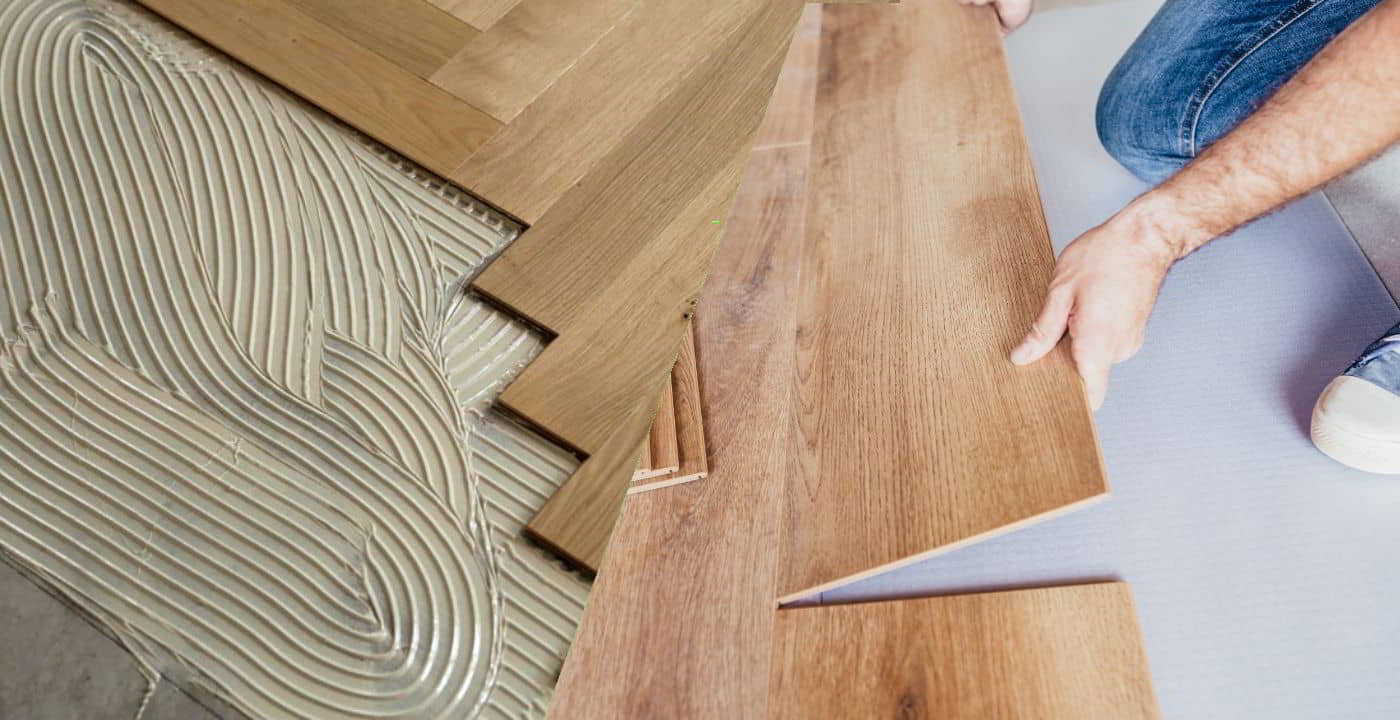
Engineered Hardwood Flooring Installation
Engineered hardwood flooring is strong and flexible, making it a favorite for many. It usually costs $7 to $20 per square foot to install, covering materials and labor.
Fancy woods or special finishes might cost more. Thicker veneer layers also tend to be pricier.
Installation Method
The installation style can change the cost. Floating floors, which are not fixed to the base, are usually cheaper and faster to install than glue-down or nail-down methods.
Complex installs, like over radiant heat or uneven floors, might cost extra.
Factors that Affect Hardwood Flooring Costs
| Cost Factor | Details |
|---|---|
| Wood Type | Different woods have different prices. Common ones are oak, maple, cherry, and walnut. Exotic types like Brazilian cherry cost more. |
| Wood Quality | Wood quality affects price. Engineered hardwood is often cheaper than solid but looks similar. |
| Installation Method | How you install it can change the cost. Nail-down and glue-down are usually cheaper than floating floors. |
| Room Size | Bigger rooms need more materials and work, costing more. |
| Subfloor Condition | If the subfloor needs fixing or leveling, it will raise the cost. |
| Additional Features | Extras like borders or custom designs increase the cost. |
| Additional Services | Extra services include taking out old floors, leveling, or adding baseboards. |
Professional vs DIY Flooring Installation
When installing hardwood floors, homeowners often either hire experts or try a DIY approach.
Each option has pros and cons. Knowing these helps homeowners pick what fits their budget, skills, and project needs.
Professional Installation
Advantages
- Expertise: Pros have the skills and experience for high-quality installation.
- Efficiency: They use special tools to finish quickly and on time.
- Warranty: Many provide warranties on their work, ensuring any problems are fixed without extra cost.
- Professional Finish: They handle details like sanding and sealing, ensuring a smooth look.
Drawbacks
- Cost: Professional installation usually costs more than DIY.
DIY Installation
Advantages
- Save money: DIY saves on labor costs, especially in small areas.
- Flexibility and control: Work at your pace and make changes as you go.
- Learn new skills: Gain valuable experience during the process.
Drawbacks
- Risk of mistakes that affect quality, like uneven planks.
- Demanding and time-consuming: Involves heavy lifting and kneeling.
Ready to Turn Your Hardwood Flooring Vision Into Reality?
Picking the right hardwood flooring is important. Now that you know the main cost factors, you’re closer to making your space perfect. You don’t have to do it alone.
Let us help you with hardwood flooring in a free consultation with our flooring installation experts. From choosing the right wood to understanding how to install and budget, our team ensures you get floors you’ll love for years.
Contact us today to set up your free in-home flooring consultation and see if we serve your area.





